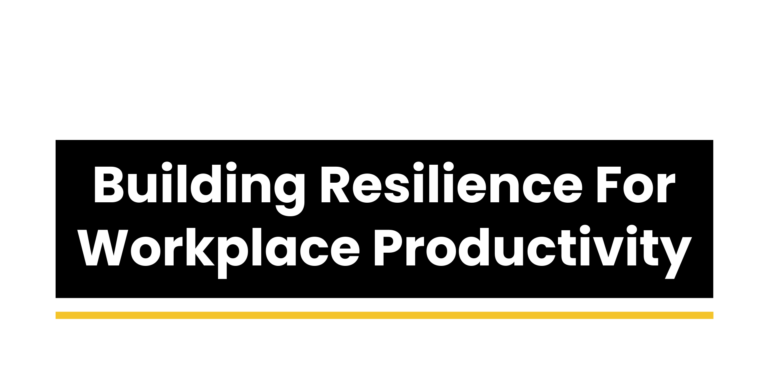

Building Resilience For Enhanced Workplace Productivity
In the fast-paced and demanding world of today’s workplaces, resilience has become a key determinant of success. But what does resilience really mean in the context of the workplace? How does a lack of resilience affect productivity, and is there a generational difference in how individuals handle workplace challenges? Moreover, can resilience be nurtured and cultivated, turning even the most uncertain and unconfident employees into motivated, goal-oriented individuals? Let’s explore these questions to gain valuable insights into the profound impact of resilience on workplace productivity. Here are my personal answers on the matter:
Question:
How employee resilience can affect workplace productivity?
1. What does resilience look like in the workplace?
2. How can a lack of resilience hamper workplace productivity?
3. Do younger workers tend to be less resilient than their older colleagues?
4. Can resilience be ‘taught’?
Answer:
From a mentor point of view I have strong opinions on what workplace resilience looks like, for example:I define workplace resilience as “the ability to take feedback well and not be offended”. So many employees get comfortable in their circle of knowledge and let’s face it, hardly any have a regular mentor or therapist they speak to hence their insecurities surface far too easily when they are told todo things in a different way, let alone ask them to raise their standards!
Question:
How can a lack of resilience hamper workplace productivity?
Answer:
Lack of resilience as per my definition most definitely hampers workplace productivity-your employer or manager will find you far less approachable and will literally be walking on eggshells hoping you don’t report to HR following your next task feedback. Needless to say new task allocation will be limited lacking to further lack of productivity. Furthermore, it is likely you will create a negative atmosphere in the workplace which is highly contagious and every manager / employer’s worst nightmare since new tasks require new skills and that is unlikely to occur in an unmotivated workplace.
Question:
Do younger workers tend to be less resilient than their older colleagues?
Answer:
It really depends on their experiences to date, I personally find young people below 30 are more coachable since they haven’t got too comfortable with a career path yet. However that is a big generalisation and it depends on employment sector. For example, a young investment banker expects to have a more gruelling experience compared to a young hairdresser. The expectations in an industry indirectly self-select a certain resilience factor in the individual.On the other hand, an older employee regardless of sector I do find more rigid to change. The comfort zone and the life responsibilities they have at this stage creates a financial pressure that sometimes removes ambition and resilience from their character. From my experience, they literally hate to get out that well known comfort zone.
Question:
Can resilience be ‘taught’?
Answer:
Absolutely-as a mentor and coach, I often see breakthrough in clients ranging from 27 to 75 years of age directly as a result of having a coach.A therapist is also recommended where possible although progress through this route alone is quite slow.A coach helps them identify their insecurities without feeling the shame of having them in the first place. Then they get the practical tools and encouragement to power past them to hit their goals. I often help create their goals by asking them what a “perfect world” would look like for them and reverse engineer that process in 12 months.It is incredible how many clients change their lives drastically for the better the they work with a coach; a whole new level of ambition and fire for life is ignited within them which creates a ripple effect in their entire life, both in workplace and at home.
